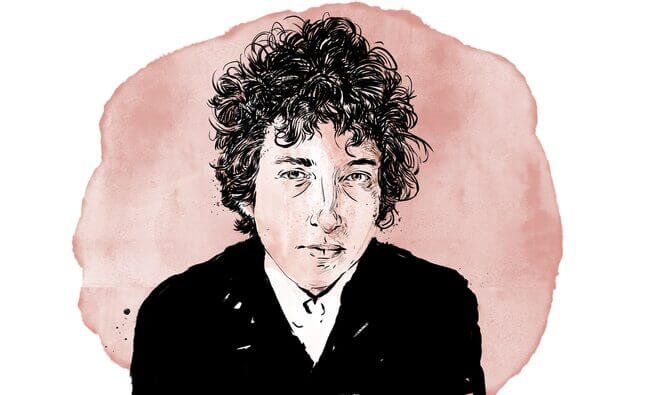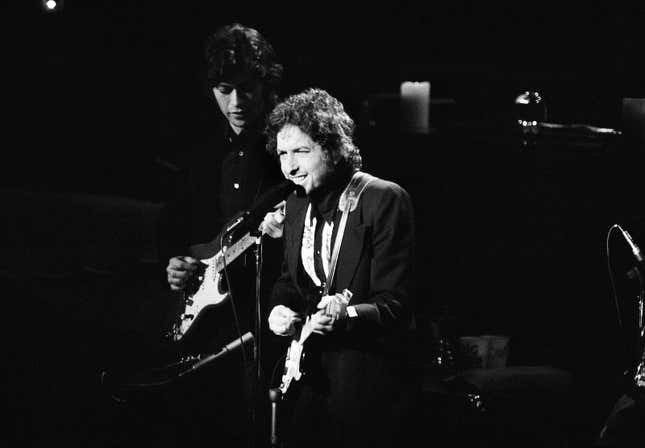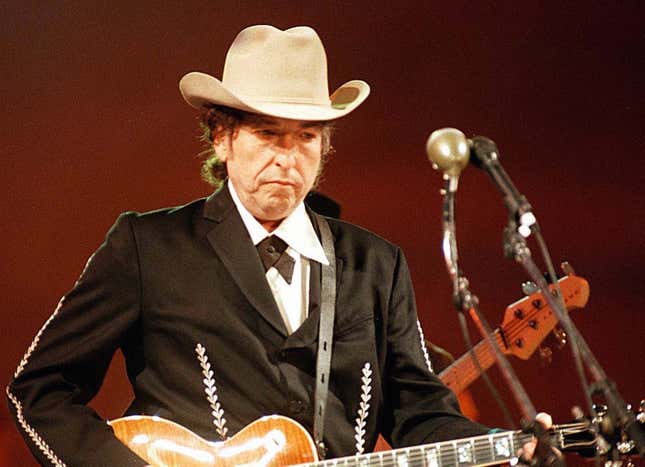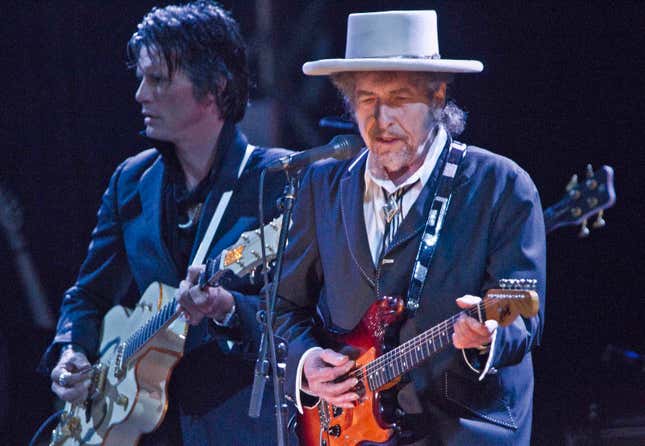How I Changed My Mind About Bob Dylan
Latest
The first time I heard Bob Dylan, I was in Seattle, 16 years old and riding in the passenger seat as my dad drove down Roosevelt on the way home from Scarecrow Video. We were listening to an oldies station, which had recently shifted from the ‘50s and ‘60s to the ‘60s and ‘70s. At the time, my taste in music was somewhere in the Venn overlap of Billie Holiday and Pulp. My dad had taught me about energetic musicians, Aretha Franklin and Janis Joplin, but my heart was still most accessible to somebody moody singing about a grudge.
Outside the car there was city darkness: neon signs and bright purple sky. “Lay Lady Lay” came on the radio and it felt like a searchlight had been switched on shining directly into my eyes, an almost unbearable sense of significance. I think I said something like “What’s this?” to my dad—I meant “WHAT IS THIS”—and he said, “It’s Bob Dylan but it’s not his best album.” Less than 24 hours later, I had my own Freewheelin’ Bob Dylan CD. That’s how I became the last person on the planet to discover that Bob Dylan is really, really, really good.
The mystery I’ve wondered about ever since: what’s so good about him? Because of my dad, I’d heard The Animals’ “House of the Rising Sun” about 50,000 times by the time I heard Dylan’s. The Animals’ version should feel more exciting—it has a bounding and rolling melody, Eric Burdon’s voice is stronger and clearer. He lets the song build; he works up to a big roar of sincere misery, vigor and regret. The Dylan version, on the other hand, is snarled virtually at a monotone. The chain that hobbles him is not his own hedonism but the hopelessness and despair he can’t escape. And yet one track feels like a beloved teddy bear and the other like the touch of living skin. There’s more person in Dylan’s voice than anyone else’s; his voice transmutes the unnerving sensation of being wholly, troublingly alive.
The difference between Dylan at his fullest and slightest is not incremental: one recording of “Girl from the North Country” will sound like something I’d put on while making dinner, while another will require my undivided attention. He seems to be able to give or withdraw that ultra-presence at will—he changes the depth of presence line by line in “Time Passes Slowly” from 1970, while changing the meaning of the title phrase in each of five repetitions—then in the same album he sings “If Not for You” just like a plain old song. At some point Dylan stopped singing in that ultra-present way almost entirely—the last song I know that I’d describe that way is “Blind Willie McTell” from 1983, but even from the late sixties they’re rarer. I don’t know what changed.Being a Dylan fan out of time, I was stuck trying to figure out this mystery alone. My high school and college friends didn’t care much one way or another. I tried reading a few books and didn’t feel like they were getting me closer to understanding anything, and I found no help in anything he’d ever said in interviews. Expecting leadership or clarity from Dylan himself or any of his songs seemed like a misunderstanding of the gift, a form of eating the goose with the golden eggs.
Expecting leadership or clarity from Dylan himself or any of his songs seemed like a misunderstanding of the gift, a form of eating the goose with the golden eggs.
My dad has said that Dylan taught a generation of white boys with terse WWII-vet fathers how to connect to their own emotions. He offered leadership to a group of kids who needed a deep-feeling version of masculinity—and I think the same people needed a route toward empathy with Civil Rights struggles and the suffering of Black America. I’m skeptical that the people doing the actual work of the Civil Rights Movement got fired up listening to “Blowin’ In The Wind” but I understand why it might have felt like vital spiritual leadership to people—especially young white men—who needed a phrase book for empathy and expression.
That’s the kernel of the difference between my fandom and the fandom of many of the authors I’ve read—I didn’t want any of Dylan’s leadership. As a young woman, I already spent too much of my mind on empathy, and his version of anti-racism seemed antique and underclaiming to me. He didn’t teach me to connect with my feelings or be myself. If anything, he was slightly hostile to “myself,” and I lingered in his music at a cost. Dylan-world was a place I could visit, not a representation of my reality. It is a place that is beautiful to me, but it’s also a place where women are only welcome if they’re super-hot. (One example among many: the opening lines of “I Shall Be Free” used to torment my teenage self.)
But I’m not careful enough with my wellbeing to stay away for long. The spell eventually influences me. One time when I was 18 and driving around Seattle with my dad, I said, listening to Blonde on Blonde: “Sometimes I think I want to be a great writer, and sometimes I think I’d rather be a great writer’s girlfriend? Like that might also be a good way of being close to something really important and amazing.”
My dad fielded this one pretty well, I think. He said “No.”
-

-

-

-

-

-

-

-

-

-

-

-

-

-

-

-

-

-

-

-

-

-

-

-

-

-

-

-

-

-

-

-

-

-

-

-

-

-

-

-











































